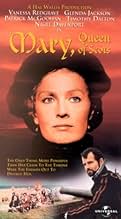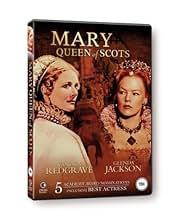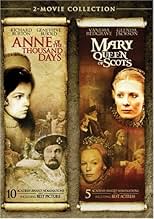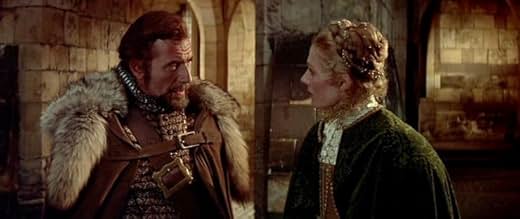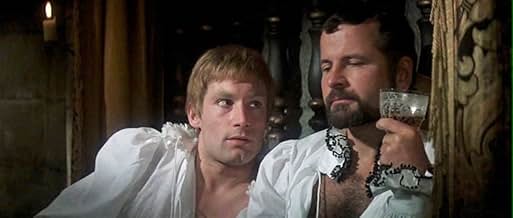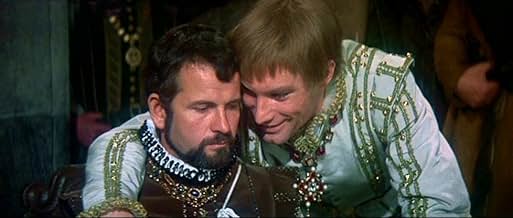Au seizième siècle, Mary, la catholique, Reine d'Écosse s'engage dans plus de deux décennies de conflits religieux et politiques avec sa cousine protestante, la Reine Elizabeth I d'Angleterr... Tout lireAu seizième siècle, Mary, la catholique, Reine d'Écosse s'engage dans plus de deux décennies de conflits religieux et politiques avec sa cousine protestante, la Reine Elizabeth I d'Angleterre, au milieu des intrigues politiques de sa terre natale.Au seizième siècle, Mary, la catholique, Reine d'Écosse s'engage dans plus de deux décennies de conflits religieux et politiques avec sa cousine protestante, la Reine Elizabeth I d'Angleterre, au milieu des intrigues politiques de sa terre natale.
- Nommé pour 5 oscars
- 2 victoires et 11 nominations au total
Avis en vedette
The script is a little clunky in places, and departs from the true historical record considerably in the name of drama: it is a pity that Darnley in particular is presented as rather one-note for the bulk of the time (although portrayed very well within the limitations of the script). However, Redgrave and Jackson are splendid, while Ian Holm gives a short but affecting portrayal of the doomed minstrel Rizzio.
Four and a half centuries ago, however, rather more was expected of a reigning monarch than turning up to the State Opening of Parliament and appearing on the cover of "Hello!". Being a Queen Regnant was a particularly difficult task, as this was a period when many believed that women, even those of royal blood, should not exercise any form of political power. (Mary's arch-enemy John Knox published a pamphlet with the splendidly bilious title "First Blast of the Trumpet against the Monstrous Regiment of Women"). If the Queen remained single as Elizabeth did, she would be accused of failing to provide the realm with an heir. If she married one of her subjects, as Mary did, she would instantly make him hated by a jealous nobility. If she married a foreign prince, as Elizabeth's sister Mary Tudor did, she would raise fears of her country falling under foreign domination. This was the era of the Reformation, so neither the Catholic Mary nor the Protestant Elizabeth could automatically count on the loyalty of those of their subjects who were of the other faith. An extra complicating factor was that Mary was Elizabeth's closest surviving relative and therefore a possible heir to the English throne, although Elizabeth never acknowledged her as such.
Mary has long been a controversial historical figure. Indeed, she was a controversial figure even in her lifetime, being forced to flee Scotland with accusations of being a "harlot" and "murderer" ringing in her ears. These accusations referred to the belief that she was guilty of adultery with her Italian secretary David Rizzio and of conniving at the murder of her estranged husband Lord Darnley, although most modern historians would take the view that there is no evidence to substantiate either charge.
The characterisation of the two Queens is similar to that in the recent film from 2018, although the 1971 version emphasises Mary's Catholic faith more strongly than does the remake. In both versions Mary is played as the more emotional and passionate, governed by her heart whereas Elizabeth is the more self-controlled and dispassionate, ruled by her head. In reality the two never met, but in the film (as in the 2018 version) they meet twice. The scriptwriters, however, are in good company; the classic German dramatist Friedrich Schiller invented a similar confrontation in his play "Maria Stuart".
Vanessa Redgrave and Glenda Jackson were two of Britain's leading actresses of this period; they have often struck me as having rather similar styles of acting, but here they give nicely differenced performances as the two contrasting queens, although Redgrave (aged 34 in 1971) perhaps seems too mature for the youthful Mary, who was only 18 when she returned to Scotland from France and only 24 when she left the country. She did not turn 34 until halfway through her imprisonment in England, a period not dealt with in any detail here.(In Schiller's play all the action takes place in England and we only hear about her life in Scotland at second hand).
I liked Nigel Davenport as Mary's third husband, Bothwell, making him rather more sympathetic than the way in which he is sometimes portrayed. He can be as ruthless as any of his enemies, but at least he comes across as sincerely loyal to Mary when everyone else seems ready to betray her in one way or another. I didn't care, however, for a pre-Bond Timothy Dalton as her second husband, Lord Darnley, who is played as childish, petulant, debauched, drunken, foul-tempered, vindictive and treacherous, with no redeeming virtues- so much so that I found it difficult to believe that Mary could have fallen in love with such a worthless individual, whose only attraction is his looks, especially as the film depicts him as a homosexual, or at least bisexual. In 1971 it was becoming acceptable for film-makers to be explicit about such matters; a decade earlier they would have had to be much more circumspect.
Having seen this film recently, for the first time in many years, I can see how much it influenced the 2018 version, which has a similar structure and similar emphases. Neither, for example, deals with Mary's childhood or her years in France, even though it was this period which formed her views and her character. (Had she been allowed to grow up in Scotland she might have been better equipped to face the challenges which confronted her as Queen). Both films are, despite their title, essentially double biographies of Elizabeth and Mary, dealing with their differing characters and with the different ways they played the hands which fate had dealt them. 7/10
The movie chronicles the struggles of Mary Stewart, who returns from France, where she had been wife to the sickly (now deceased) king Francois II, to Scotland, where her Protestant half brother, Jamie, is acting as Regent. In order to secure the Scottish throne for herself and her son (later James VI of Scotland and James I of England), she must battle the Scottish Lords, her brother Jamie, who causes rebellions against his sister, and even her second husband, Lord Darnley, who makes a bid for the throne himself. The most devastating enemy proves to be her royal English cousin, Elizabeth I, who sees Mary as a threat, especially when Mary produces (with Darnley) a son while she (Elizabeth) remains unmarried and childless.
The main asset of the movie lies in its two female leads, who portray the warm, emotional Catholic Mary and the cool, calculating Protestant Elizabeth. Vanessa Redgrave made, at least for me, a convincing enough Mary. Especially, however, I recall Glenda Jackson as an absolutely brilliant Queen Elizabeth. She IS Elizabeth, and I believe to a certain extent, it's really her movie. To this day, whenever I picture Elizabeth I, it's Glenda Jackson, who of course went on to play the Virgin Queen in the TV series, Elizabeth R.
Others in the star studded cast include Patrick McGoohan as James Stewart (Mary's brother), Timothy Dalton as Lord Darnley (Mary's weak, conniving second husband), and Nigel Davenport as Bothwell (Mary's true love and third husband). Two of Elizabeth's ministers are portrayed by Trevor Howard as Sir William Cecil, and Daniel Massey as the queen's devoted Dudley.
Beautiful Oscar nominated Tudor period costumes and scenes. I would like to see again the tale of this tragic figure, a woman who should have been content with her Scottish crown and not covetous of the English one as well. Pity modern cinema seems disinclined to delve into these British historical dramas. Personally, I would like to see more movies such as this one and the 1986 Lady Jane with Helena Bonham Carter. There's certainly no lack of historical figures that would make interesting subjects.
Le saviez-vous
- AnecdotesThe film was released the same year as the miniseries Elizabeth R (1971), in which Glenda Jackson also played Queen Elizabeth I. In that production, Vanessa Redgrave's mother Rachel Kempson played Kat Ashley, Queen Elizabeth's governess during her childhood and the Lady of the Bedchamber during the early part of her reign.
- GaffesThe meetings between Queen Elizabeth I of England and Queen Mary Stuart of Scotland in the borderlands and in Mary's cell before her execution have no basis in any factual/historical account of these rulers. However, it is stated in the film that these meetings were secret and never mentioned even to Elizabeth's closest advisers.
- Citations
[last lines]
Executioner: Forgive me, madam.
Mary, Queen of Scots: I forgive you with all my heart. I thank you even. I hope this death shall put an end to all my troubles. For in my end is my beginning.
[pause]
Mary, Queen of Scots: Lord, into your hands I commend my spirit.
- ConnexionsFeatured in Mark Kermode's Secrets of Cinema: British History Movies (2020)
Meilleurs choix
- How long is Mary, Queen of Scots?Propulsé par Alexa
Détails
- Date de sortie
- Pays d’origine
- Langue
- Aussi connu sous le nom de
- Mary, Queen of Scots
- Lieux de tournage
- Alnwick Castle, Alnwick, Northumberland, Angleterre, Royaume-Uni(Holyrood Palace)
- sociétés de production
- Consultez plus de crédits d'entreprise sur IMDbPro
Box-office
- Brut – États-Unis et Canada
- 2 325 818 $ US
- Durée2 heures 8 minutes
- Rapport de forme
- 2.35 : 1
Contribuer à cette page



